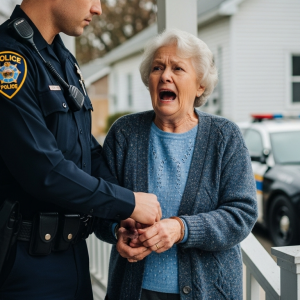The woman in the red jacket didn’t even glance at Lily when she said it. “Honey, save your money for yourself. You clearly need it more than he does.” She just pushed her full cart forward, letting her words hang in the air like facts.
Everyone in line heard it. The cashier, a nervous teenager, froze. The old man in the pale green jacket looked down at his few items on the counter: bread, a can of soup, eggs, milk. His hands trembled as he reached for a wallet held together by rubber bands.
Lily stood still for a second. She didn’t make a scene. She just reached into her back pocket, pulled out the worn $20 bill she had been saving, and handed it to the cashier. “I’ve got it,” she said, her voice calm and clear.
The woman in red let out a soft, smug chuckle and walked away. The man turned toward Lily, his expression hard to read. He looked tired but not weak. “You didn’t have to do that,” he said, his voice low.
“I know,” she replied. “But I wanted to.”
He studied her face for a moment, then gave a slow nod. As he picked up his bag, he leaned slightly closer. “You have no idea what you’ve just done.” He didn’t explain. He just turned and walked out into the rain.
Lily started the mile-and-a-half walk home, her own plastic bag holding only bread, peanut butter, and pasta. When she got to the duplex, her little sister Zoe was on the couch, drawing with the last pencil stub they had. Lily made them both a quiet dinner. After tucking Zoe in, she sat on the floor, scrolling through her phone for scholarships she probably wouldn’t get.
Around midnight, she heard it. Three slow, steady knocks at the front door. Her stomach tensed. No one ever came this late. She tiptoed to the window and pulled the curtain back. Along the street, parked in the drizzling rain, were three identical black SUVs. Headlights off, windows tinted.
Another knock. Same pattern. Calm, spaced. Then a voice came, low but clear, from just outside the door. “Is this the home of Lily Carter? The girl who paid for Agent Reese Langford’s groceries?”
Agent? The word didn’t compute. She hadn’t asked the man’s name. Was this a joke? The man outside waited, then continued. “Miss Carter, we are not here to harm you. We believe you may have unintentionally activated a dormant protocol. We need you to come with us.”
Her hands shook. She looked at Zoe, sleeping soundly, unaware of how the night had shifted. She thought about staying quiet, but the man’s voice came one last time. When she finally opened the door, a tall man in a suit stood there, his eyes meeting hers.
“Miss Carter,” he said. “I am Agent Green. We need you to come with us right now. It is urgent.”
“Why?” her voice was small but steady.
He looked at her seriously. “Because the man you helped today, Reese Langford, has been missing for 16 years. And until a few hours ago, we believed he was dead.”
In the back of the silent SUV, an agent handed her a folder. Inside was a security camera still of her at the grocery store. Underneath, the name: LANGFORD, REESE. Senior Operative, US Intelligence. Disappeared 2009. They arrived at a private airfield where a small jet was waiting. Onboard, another agent slid a thin folder across the table. It was stamped with four words in bold, black letters: DECLASSIFIED: OPERATION SILENT SPARROW.
Sixteen years ago, Langford had been investigating a corrupt financial-military network with ties to elected officials. The investigation went dark after he vanished mid-operation. Officially, it was a failed deep cover mission. Unofficially, many believed he’d been silenced by someone on the inside.
“He went off the grid to stay alive,” Lily murmured, reading a handwritten note in the file.
The agent across from her nodded. “Exactly. But for him to allow you to see his face, to accept help, may have triggered a surveillance signal we’d embedded long ago. One we’d almost forgotten existed.”
“So what do you need from me?” Lily asked, her hands clenched.
“We need you to identify him. Speak with him. We believe he’ll talk to you. And we need to know why now. Why he let himself be seen.” The agent met her eyes. “There are others who want to find him before we do. And they are already moving.”
The facility was a white concrete building in the middle of nowhere. The hallways were sterile and quiet. Agent Green stopped at a door. “He’s inside. No cameras, no microphones. Knock if you need out.”
Lily pushed the door open. The room was small, with just a table and two chairs. Langford was there, dressed in a plain gray sweater, looking older than she remembered, but alert.
“I waited for decades,” he said finally, his voice more worn than before. “I just didn’t think it would be a teenage girl who would break the silence.”
“I didn’t mean to break anything,” Lily swallowed. “I just saw someone who needed help.”
“And that’s why it worked,” he said. “They trained me to spot setups, not to trust kindness. Kindness is usually a tactic. But you paid and you left. No questions. You just did it. That was the first real thing I’d seen in sixteen years.”
“Why did you disappear?” she asked.
“Because every time I tried to come forward, someone died,” Langford said, his voice flat. “Someone close to me was erased. Not by strangers. By people on the inside. People who were supposed to be the good ones. So I erased myself.”
He paused, then reached into his sweater and pulled out a small, worn notebook. He slid it across the table. The pages were filled with handwriting, but one page near the center had only a single sentence in faded blue ink: The tree that saw me leave my name.
“What does this mean?” she asked.
“That’s where I buried everything,” he said. “All the proof. Names, bank codes, recordings. Everything that could take them down.”
“But I don’t know how to read clues,” she protested.
“You already figured out more than most,” he replied. “I trust that if you listen closely enough, you’ll know where to look.”
The line from the notebook kept repeating in her mind. The tree that saw me leave my name. It sounded too poetic for a clue. She looked at Langford. “Why leave behind something so personal?”
He smiled for the first time, a small, sad gesture. “Sometimes the safest place is the one no one thinks is serious. They would look for numbers, coordinates, ciphers. Not something from a book.”
And then it hit her. She had read that line before. Not in a report, but in a small poetry collection she’d picked up from a thrift store years ago. It was from a poem about memory and identity.
“That’s not a clue,” she whispered. “That’s a poem. From my favorite book.”
Now it was personal. He wasn’t hiding the evidence where no one would find it. He was hiding it where only someone like her would know how to look.
It took less than an hour to get to the library. It was an old building on the edge of town, one most people forgot existed. Langford used to work there part-time as a security guard. She walked in alone. In the poetry section, she found the dark green book, the same edition she had at home. Near the middle, a page felt heavier. She gently pulled at the corner, and a folded, sealed envelope slipped into her palm.
Inside were five handwritten sheets. Names of politicians and executives. Bank account numbers connecting shell companies to defense contracts. And on the final page, a warning: If they find out you have this, you will not be safe. Not even for a second.
As she left the library, Agent Green’s expression changed. “You found it,” he said.
“We need to move,” he ordered as they got in the car. But it was too late. Two dark SUVs appeared behind them, matching their every move. The chase was short. They were boxed into an alley. A man in a gray mask stepped out.
“Give me the girl,” he said loudly and clearly, “or give me the book.”
Before Green could react, another vehicle slammed into one of the SUVs, a third party entering the fray. Their driver hit the gas, scraping past the blockade as shouts filled the air. They escaped.
At a secure warehouse, Green told her the truth. “Someone inside is feeding them information. Someone high enough to know our movements. We can’t protect you.”
Lily looked at the envelope in her hands. Hiding would never end. “I want to bring this out myself,” she said, her voice clear. “To the press. On my own terms.”
Before she did, she met with Langford one last time. “There’s something I need to understand,” she said. “Why did you wait sixteen years?”
His voice was a slow, painful rasp. “Because it wasn’t someone on my team who gave me up. It was someone in my own family. My son.” He had protected his son, who was still deeply embedded in the corrupt agency, by disappearing.
That night, Lily sat in front of her phone camera. No makeup, no script. Just her in a plain sweater. She hit record.
“This is not about revenge,” she began, her voice steady. “It’s about remembering what silence has cost us. My name is Lily Carter. I am not a whistleblower. I am just someone who found something and could not look away.”
She didn’t list all the names. She told the story. She explained the evidence. And she uploaded the three-minute video with a simple title: For those who always wondered. Then she closed her laptop and waited.
The video spread not because it was polished, but because it was real. Within days, the story exploded. Former employees came forward with corroborating evidence. A regional director resigned. A senior adviser deeply regretted his “inaction.” One by one, the so-called respectable ones began to fall.
Lily, however, was nowhere to be found. She did no interviews, accepted no book deals. A year later, she appeared at a small town TEDx event, listed only as “L. Holden, Youth Advocate.”
“I am not here because I am brave,” she told the small crowd. “I am here because one man let me see who he really was, and I chose to believe him. He told me once, keeping quiet never protected anyone. It only prolonged the damage.”
A few weeks after the talk went viral, Langford passed away quietly in his sleep. A small package arrived at Lily’s door. Inside was a wooden box containing his military medal and a short, shaky letter: Thank you for letting me be seen before I was gone.
Two years have passed since that day in the store. Lily now runs a small nonprofit center. On a back wall, there is a collection of photos of ordinary, forgotten people from the community—veterans, factory workers, a retired librarian. Each photo is labeled with a single word: Seen. Langford’s picture is among them, taken from the grocery store security footage.
Sometimes, she stands before the wall, a quiet monument to those who were almost forgotten. The world didn’t change overnight because of her. But she reminded one man that it was still worth saving. And in doing so, she found that paying for groceries wasn’t the gift. It was the invitation to remember who we are.
As Lily stood before the wall of photos, each one marked with a single word, “Seen,” she couldn’t help but think about how far she’d come. The faces staring back at her were a reminder of everything she’d endured, the sacrifices she’d made, and the decisions that had changed the course of her life. In a way, the wall wasn’t just about those who had been overlooked by society. It was about her, too. It was about how she had once felt invisible, insignificant, and how she had fought to be seen, to be heard, to matter.
Her phone buzzed on the table, interrupting her thoughts. It was a text from her best friend, Hannah.
“Hey, I know you don’t want to hear this, but you should really think about sharing the book. You know, the one with all the names and connections. The one Langford had. You might be able to expose even more.”
Lily stared at the message for a long moment. She had wrestled with the idea of revealing the rest of the information Langford had given her — the names of officials, the dark web of corruption, and the way it all tied back to powerful families, including her own. But Lily had learned something crucial in the months since the video went viral. Revenge wasn’t always the solution. Sometimes, it was about letting people see the truth and letting that truth dismantle everything on its own.
She typed a quick reply, her fingers hesitating on the keys.“I don’t need to bring more damage. The world will expose itself eventually. I did what I had to do. The rest is on them now.”
It was the final decision she would make in this chapter of her life. She wasn’t going to be the one to carry the weight of everyone else’s sins. She had already given them enough of a head start.
The next few months were a whirlwind of newfound stability. Lily’s nonprofit organization began to gain traction, and her role as the founder of the center grew. Her work with local communities, providing support for vulnerable youth and advocating for those who felt forgotten, started to resonate with more and more people. Her story, her involvement in the Langford case, and her decision to step out of the shadows had become part of a larger narrative. It wasn’t about one woman taking down an entire system, but about a collective voice that refused to stay silent.
In her quiet moments, she still thought of Langford. His sacrifice had changed her, had shown her what it meant to truly risk everything for the sake of truth. It had made her realize that she, too, had a responsibility to fight for the truth, not just for herself, but for those who didn’t have the same opportunities or the same voices. But she also knew that, as much as his story had intersected with hers, they were not the same person. She was not him.
Lily began to focus on what she could control. She moved into a new apartment — one that felt like her own space, a fresh start. It was small, but the windows overlooked a quiet street with trees lining both sides, and for the first time in a long time, it felt like peace.
One late evening, after spending hours working on a grant proposal for her nonprofit, Lily received an unexpected phone call. It was a number she didn’t recognize. Her heart skipped a beat, but she answered anyway.
“Lily Carter?” the voice on the other end asked, sounding official but not threatening. “This is Officer Jacobs. I’m with the FBI. I’m calling about Reese Langford.”
Lily felt a cold sensation run down her spine. “What about him?” she asked cautiously.
“We’ve been following up on the case you helped us with. We’ve found new leads, and some of the names you provided have turned out to be more significant than we originally thought. This is… bigger than we thought.”
Her pulse quickened. “Bigger how?”
“There’s been a substantial uncovering of a financial network that stretches back decades. It involves multiple high-ranking government officials, private contractors, and intelligence agencies — and it’s all tied to the same individuals who had Langford silenced. We’re talking about people who thought they were untouchable.”
Lily absorbed the information, her mind racing. “So… Langford wasn’t just a small piece of this? He was the beginning?”
Officer Jacobs paused. “Exactly. And there’s something else. The information you gave us about the network… it’s changing the game. We believe the corruption runs deeper than we even realized.”
Lily’s thoughts spun. Langford had been right. The conspiracy had been so vast, so well-hidden, that even after everything that had happened, there was still so much more to uncover. She didn’t know whether to feel relieved or terrified.
“I’m glad you’re still in the loop,” she said quietly. “But I don’t want to be involved anymore.”
“You’re already part of this,” Jacobs said, his voice serious. “And frankly, your role in the story can’t be underestimated. If you don’t mind me saying, you’ve become a symbol of what happens when people refuse to stay silent. We’re going to need your help again. We believe the people behind this might be going after those who’ve exposed the truth. Including you.”
Lily felt a chill in the air. “What do you need me to do?”
“Stay alert. Stay safe. We’ll keep you informed on the progress, but for now, I’d suggest you keep a low profile.”
She nodded, even though she felt a wave of exhaustion crash over her. She wasn’t ready for this kind of fight again. But she also knew one thing for certain: she would never back down.
The next few weeks were tense. Lily kept her head down, continued her work, and stayed in close contact with Officer Jacobs. Every now and then, he would call with updates, letting her know they were getting closer to taking down the last of the network. But Lily knew the real fight wasn’t over yet. It was never just about taking down the people who wronged Langford — it was about protecting the innocent, ensuring the truth continued to surface, and making sure the people who hid in the shadows would never feel safe again.
Months passed, and the investigation slowly began to wind down. Some of the biggest names in the corruption network were arrested, and the media covered it in waves. But Lily knew that there was always more to uncover, more truths to be revealed. There was always someone else pulling strings behind the scenes, just out of sight.
She stayed involved, but at a distance, continuing her work with the youth center and supporting others who needed help finding their voice.
One afternoon, she received an unexpected letter. The return address was unfamiliar, but it was stamped with a government seal. Inside, she found a simple note: “Thank you for giving us the truth. The world is safer because of you.”
It was signed by Officer Jacobs. And at the bottom, a small but important detail: “Your involvement was invaluable. Your name will never be forgotten.”
Lily smiled, the weight on her shoulders lighter than it had been in years. The truth had come at a great cost, but it had been worth it.
As she stood before her photo wall in the nonprofit’s office, Lily added one more face to the collection. It was her own. Not as the whistleblower, not as the girl who took down a corrupt network, but as someone who had chosen to be seen, to stand up for what was right, and to make sure that others who came after her would have a voice too.
In the end, it wasn’t about the secrets she had uncovered, the battles she had won, or the lives she had changed. It was about remembering that every single person had a story. And sometimes, the most powerful thing you can do is make sure that story is heard.




